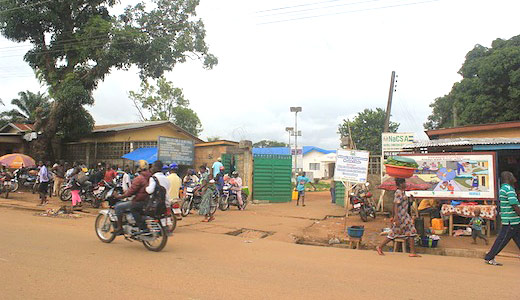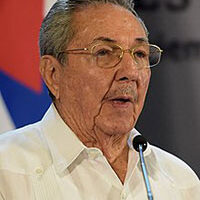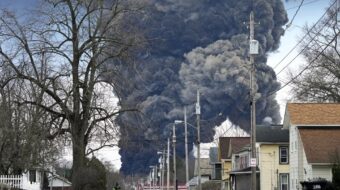
Editor’s note: President of Cuba Raul Castro opened the Special ALBA Summit on Ebola, initiated by Venezuela President Nicholas Maduro, hosted in Havana. His welcome speech is published below.
Cuba was the first country in the world to answer the urgent call for medical personnel to help stop the spread of Ebola in West Africa by sending 165 doctors, nurses and health care professionals to Sierra Leone. Cuba has been praised for “punching far above its weight” in its commitment, compared to the United States and other wealthy nations. Praise comes from voices as diverse as the United Nations to the New York Times.
ALBA stands for the Bolivarian Alliance for the Peoples of Our America, a trade group with a solidarity ethos, established in 2004 by Cuba and Venezuela. There are now nine ALBA member countries and several observer nations. In responding to the growing international crisis, nations of Latin America and the Caribbean are convening in Cuba to discuss how to stem the disaster in West Africa through international cooperation.
Ebola and the challenge to humanity
A dreadful epidemic is advancing today on our fraternal peoples of Africa, and threatening us all. A high number of cases have been diagnosed with Ebola and many people have perished from the disease in several countries, including two outside the African continent.
This poses a huge challenge to humanity, one that should be met with utmost urgency. The action of the international community as a whole, under the leadership of the World Health Organization, the Pan American Health Organization and the UN Mission for Ebola Emergency Response, is much needed.
As part of the melting pot of Latin American and Caribbean cultures, African blood flows through the veins of “Our America,” contributed by those who fought for independence and helped in the creation of wealth in many of our countries and others, the United States included.
Africa and Cuba are bound together by deep affection. Over 76,000 Cuban collaborators have rendered health services in 39 countries, while 45 nations have had 3,392 physicians trained in Cuba absolutely free of charge.
At the moment, more than 4,000 Cuban health care collaborators are working in 32 African countries and, as our Public Health minister will explain; they are all joining in the preventive effort against Ebola.
On Oct. 1, in response to a request from the director general of the World Health Organization, Dr. Margaret Chan, and UN Secretary General Mr. Ban Ki-Moon, a specialized Cuban medical brigade traveled to Sierra Leone to take part in the struggle against that epidemic; and Tuesday, Oct. 21, two other Cuban brigades, whose leaders are already in the field, will be leaving for Liberia and Guinea.
The numerous alerts and concerns recently manifested over the insufficient resources contributed and the pace of the actions are a reflection of the growing universal awareness on the necessity to move ahead promptly in order to avoid a humanitarian crisis of unpredictable consequences.
I stand convinced that if this threat is not held back and resolved in West Africa, through an immediate and effective international response, with sufficient resources and coordinated by the World Health Organization and the United Nations, it may evolve into one of the gravest pandemics in the history of mankind.
Actually, such a noble and urgent endeavor demands the indispensable commitment and dedication of every nation in the world, to the extent of everyone’s possibilities.
We are of the view that this grave problem should not be politicized to avoid the risk of losing track of the main objective, which is helping to confront the epidemic in Africa and to prevent its expansion to other regions.
Following my conversation with the UN secretary general, Sept. 5, instructions were given to our representatives in events called by the World Health Organization and the United Nations, to reaffirm that Cuba is willing work side by side with every country, including the United States.
The modest experience accumulated by the Cuban health care system indicates that an integrating disposition is required, along with the proper organization, planning and coordination, not only of the clinical and healing work but also of preventive measures. An inescapable complementation to this would be the systemic and permanent labors of the specialists who shall exercise great discipline and seriousness in the observation of the medical protocols established. In the course of this meeting, we shall discuss the practical features of this matter.
In order to avoid being affected by the virus, we should prepare ourselves intensively, work together throughout the Americas on preventive measures, and be ready to deal with the disease and prevent its dissemination.
We wish to submit to the consideration of the member countries of ALBA and the Community of Latin American and Caribbean States (Celac) some collective proposals of cooperation that may help in training the health care personnel and designing and implementing comprehensive and effective preventive measures, giving a priority to Haiti and the Caribbean countries; we should all assist the most vulnerable states.
At the same time, we invite the countries of North America to also cooperate in this endeavor.
If the respective governments would agree, our health care collaborators currently working in Latin America and the Caribbean, could support, to the extent of their capabilities, the preventive actions and the training of local personnel, as well as offer advisory.
In summary, we have 45,952 Cuban health care collaborators working in 25 countries of Our America, 23,158 of them, that is, 50.4 percent are doctors, who along with their colleagues from the continent make up a powerful force capable of meeting such a challenge.
It’s worthwhile recalling that many countries of our region count on 23,944 doctors graduated in Cuban universities until today, basically in the past fifteen years.
Finally, on Dec. 14, we will host another summit in Havana to celebrate the 10th anniversary of ALBA, the fruit of the will of our peoples in the region and of the actions of Hugo Chavez Frias and Fidel Castro Ruz. We look forward to that opportunity when we shall examine the implementation of what we agree here today.
Without further delay, we declare this Special Summit open.
Thank you, very much.
Photo: This photo taken in June shows a hospital in Kenema, Sierra Leone, where blood samples are tested to see if someone has the Ebola virus. Cuba has sent a medical brigade to Sierra Leone to help the struggling nation reverse the epidemic (CC).
CORRECTION: In a previous version, the author was incorrectly identified as Cuba’s former president, Fidel Castro. The welcome was given by Cuba’s current president Raul Castro, Fidel’s brother. We regret the error.












Comments